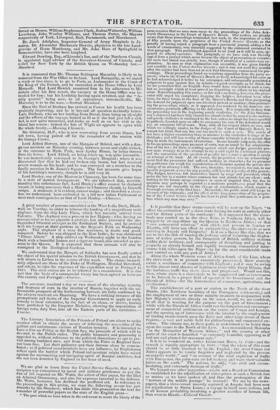We arc glad to learn from the United Service Gazette,
that a sub- scription was commenced by naval and military gentlemen to pay the .fine of 50/. imposed on Mr. Watts, the editor of that paper, for the libel on Admiral Ommanney, and also the expenses incurred in the defence. Mr. Watts, however, has declined the proffered aid. In reference to the proceedings in this action, we copy the following severe but just remarks by the Standard; which has made this prosecution the text for a number of powerful papers on the state of the English press-
" The part which we have taken in the endeavour to assert the liberty of the
press requires that we once more recur to the proceedings of Sir John Ack- worth Ommanney in the Court of Queen's Bench. Our readers are already aware that these proceedings terminated last week, in the imposition of a fine of fifty pounds upon the proprietor of the United Service Gazette, as the penalty of having copied a paragraph from a provincial journal, adding a few words of commentary, very naturally suggested by the statement contained in that paragraph. This punishment, appeared to us (and as it will be seen, ap- peared to others) excessive. The paragraph, as we have said, was literally copied from a journal which never became the object of prosecution or censure; the main fact stated was strictly true, though it admitted of a satisfactory ex- planation. As soon as that explanation was accessible, it was given frankly and candidly in the United Service Gazette; and it was not until five months after the matter had been thus set at rest that Ommanney commenced his pro- ceedings. These proceedings found no vexatious opposition from the party ac- cused; who in the Court at Queen's Bench as freely acknowledged his error as he had acknowledged it before in his newspaper, and subsequently permitted a judgment to pass against him by default,—a great oversight, as we think, for we are persuaded that no English Jury would have convicted in such a case, but an oversight which at least proved no disposition to adhere to his original error. Notwithstanding this course, so fair and emiciliating, however, the prose- cutor still urged his complaint; dragging the helpless defendant term after term, for three terms, to the floor of the QILCCII'S Bench, and then postponing the demand for judgment upon one frivolous pretext or another; thus protract- ing the persecution, which, as it appeared, 'MIS rendered by his domestic cir- cumstances peculiarly afflicting to the defendant. It is impossible to deny that the proceeding was in the beginning purely vindictive, fir Sir John Omnum- ney's character had been fully cleared live months before lie moved in the matter; and purely vindictive it continued to the last, unless we adopt the less respectful hypothesis, founded upon an offer to compound the case if the defendant would. pay an enormous bill of costs. Now, with all the respect which we owe, and which we willingly render, to the Judges of the Court of Queen's Bench, we cannot but think that any fine was too much in such a case. The courts of law have a higher commission than to minister to the vindictive ffelings of in- dividuals ; and still less worthy of those venerable tribunals is it to permit that they be made the instruments of extortion. In our humble judgment, the offer to forego proceedings upon payment of costs, was an insult to tile administra- tion of the law ; for there is nothing against which our Judgei generally pro- test more strongly than the attempt to try a civil right by a criminal process ; and the conver:ion of the question of pehalty into a timothy question is surely an attempt of' ths kind. At all events, the proposition was an acknowledg- ment that the prosecutor had suffered nothing in character ; for we presume no gentleman can weigh the consideration of character against the Ovate dis- charge of an attorney's bill. The case, thenthre, we ripeat it, was not, in our humble judgment, a case tbr any penalty, still less for a penalty of fifty pounds. The Judges, however, felt themselves bound by usage and precedent, which make the law in a matter where common law and statute law are silent ; and,
looking to the former savage sentences in cases of imputed libel, the fine in question may perhaps be regarded as a moderate penulty,—a proof that the
Judges are not insensible to the change of circumstances, which require a thorough revision of the libel limes. Meanwhile, the public mind still keeps in advance or the tribunals; and the effect of the long persecution of the proprie- tor of the ]'mired service Gazette has been to place that gentleman in a posi- tion which any man may envy."


























 Previous page
Previous page